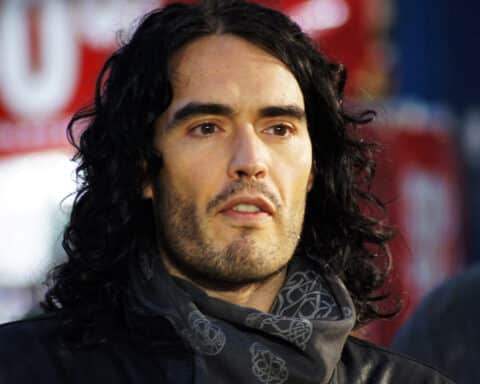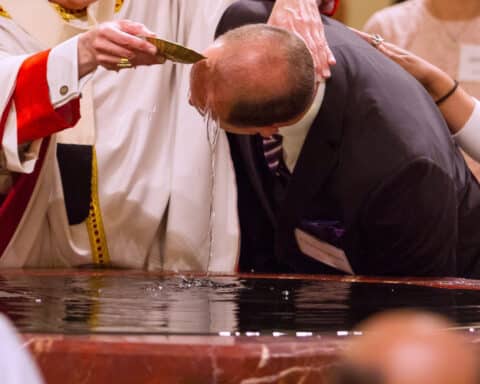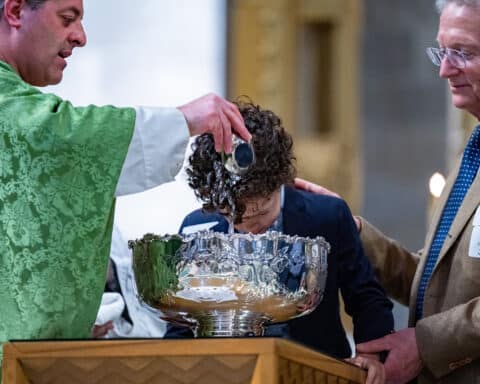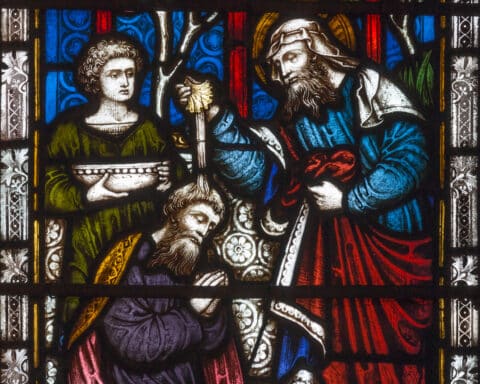
— John J. Petrus, North Versailles, Pennsylvania
Answer: Clearly, this is a very unfortunate situation. The priest who caused the problem does not seem to be a dissenter, and it is likely he was poorly trained or fell under the influence of poor example or teaching.
The Church in Phoenix is not simply leaving the matter up to the laity. They are making every effort to contact those who may have been invalidly baptized and inviting and instructing them in how to rectify the problem.
As to the question of why the Church cannot simply issue a “general sacramental remedy” to validate the baptism, there are some things the Church simply can’t do. In certain cases where there were technical problems in the celebration of a sacrament involving jurisdiction or dispensations and the like, it is sometimes possible for the Church to issue a “sanatio in radice” (a healing in the root), which rectifies these problems judicially. There is also an expression, “ecclesia supplet” (the Church supplies), for other incidental errors.
However, when it comes to matter and form, the Church cannot simply declare that a sacrament that did not take place actually did take place. Matter and form are what make a sacrament; they are essential. In the case of baptism, the matter is the triple pouring of or immersion into water. The form is the words: “I baptize you in the name of the Father, and of the Son and of the Holy Spirit” with each pouring or immersion. This is what makes for the sacrament. The Church cannot with a simple declaration say a sacrament occurred when it did not any more than a doctor can simply say he removed a tumor when he did not.
In cases like the Phoenix situation, only God can supply. God of course is just and would not, in justice, refuse salvation to those who in good faith thought and acted as though they were validly baptized. God is not bound by the sacraments, but we are. Therefore if it comes to light that something essential was missed, both the Church and those aware of the problem ought to seek to rectify it together.
Double blessing objects
Question: I wear a sterling silver Miraculous Medal, which I cherish. It has been blessed by a priest in Italy (where it was purchased) and three of the priests at our local parish here in Scottsdale, Arizona. As I travel, I hope to have it further blessed by as many priests as possible. Is this wrong? Is it possible for a sacred, holy object to be “over-blessed?” The amount of blessings that it has received have physically brought me to tears and also brought me an immeasurable level of comfort, joy and, literally, the love of Christ.
— K.J., Phoenix, Arizona
Answer: No, unfortunately, this shouldn’t be done. Once an object is blessed, it is blessed. Technically speaking, to bless a knowingly blessed object is a sacrilege. However, this word is harsh and clearly not what you intended to do. But the point to understand and maintain is that objects are blessed only once. If a sacred object such as a statue or a chalice is broken and repaired or renovated, it can be blessed again. But otherwise, objects are blessed only once. Perhaps instead you could bring holy cards or other medals to be blessed by the priests you meet. Collecting these individual medals or cards may be a way to honor your intentions and provide the consolation you seek.
One may wonder, if things are only to be blessed once, how is it that people are blessed over and over? They are blessed at every Mass and whenever they request a blessing. Is this wrong? No it is not. Medals, cards, statues, etc., are things; they are objects. But human beings are subjects who undergo changes, growth and sometimes regression. As such, they are able to be blessed regularly and repeatedly.
Msgr. Charles Pope is the pastor of Holy Comforter-St. Cyprian in Washington, D.C., and writes for the Archdiocese of Washington, D.C. at blog.adw.org. Send questions to msgrpope@osv.com.





